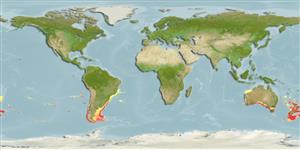Preferred temperature (Ref.
115969): 3.3 - 12.7, mean 7.2 (based on 279 cells).
Phylogenetic diversity index (Ref.
82804): PD
50 = 0.5156 [Uniqueness, from 0.5 = low to 2.0 = high].
Bayesian length-weight: a=0.00219 (0.00131 - 0.00366), b=3.17 (3.02 - 3.32), in cm Total Length, based on LWR estimates for this species & (Sub)family-body (Ref.
93245).
Mức dinh dưỡng (Ref.
69278): 4.2 ±0.76 se; based on food items.
Thích nghi nhanh (Ref.
120179): thấp, thời gian nhân đôi của chủng quần tối thiểu là 4.5 - 14 năm (K=0.1-0.23; tmax=30; tm=5-7).
Prior r = 0.25, 95% CL = 0.16 - 0.37, Based on 4 full stock assessments.
Fishing Vulnerability (Ref.
59153): Very high vulnerability (84 of 100).
Climate Vulnerability (Ref.
125649): Moderate vulnerability (44 of 100).
